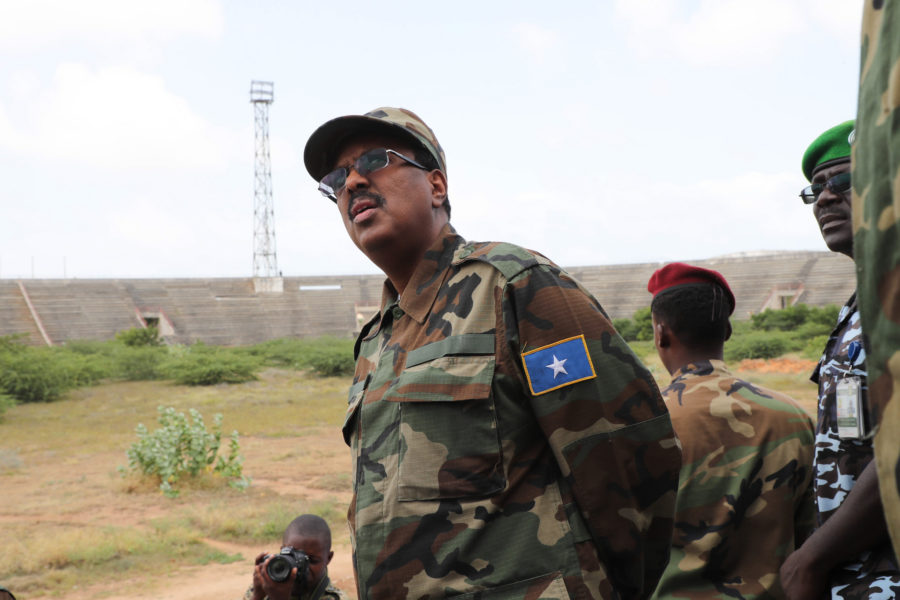Farmaajo further isolated as state leaders opt for parallel army

By T. Roble
Federal Member States will form their own army and intelligence network to counter the militant group Al-Shabaab in a move that could have far reaching consequences on the implementation of the National Security Architecture and the Security Pact agreed by international donors May 2017 in London.
In a communique Thursday following a three days meeting in Garowe, the leaders of Puntland, Jubbaland, Garowe and South West states said they could no longer rely on the Federal Government to secure the country noting that all security agreements reached before ‘have remained to be just plans written on papers’.
Noting that their cession of relations with the federal government arrived at in the last conference early September in Kismayu still holds, the state leaders said it was now time they took matters into their own hands since ‘the FGS in its current form and behavior cannot be trusted with the security of the country’.
WAY FORWARD
Galmudug president Ahmed Haaf who was appointed new deputy of the Council of Inter-Governmental Cooperation (CIC), the umbrella bringing together the FMS leaders, first muted the idea of an inter-state army at the opening of the conference Monday.
The four leaders said Thursday they had now settled for the idea and that in the next two months, 1,000 soldiers from each Federal Member State (FMS0 will ‘integrate and train together for smooth, seamless and unified offensive against terrorists’.
The paramilitary units (darawish) will be established under one command and control, the communique reads and shall be funded from the Security Fund Account to be established and will draw resources from each member state.
Besides the joint force, the state leaders said they will also establish a ‘joint intelligence network to share intelligence and information about the enemy’.
But should the federal state make real their proposals, the integration process is likely to be jeopardized. It means the states will hold their forces from being integrated into the national army starving SNA of the numbers as set in the NSA
Both the intelligence and army units will however be integrate into the federal structure later, the leaders said. “When a Federal Government with genuine Somali vision and clear orientation on security is realized, the Council will handover this integrated forces to be the bases of the new Somali National Army (SNA) free from clan and political orientation.”
WHAT IT MEANS
The move by the federal states to take their own direction in regards to security approach in the country raises critical questions on the realization of a unified, professional and strong Somali Security Force as contemplated in various local and international agreements. The African Union force, AMISOM has been documenting and capturing bio-metrics of regional state forces as part of the integration process in line with provisions of the National Security Architecture (NSA) and the Security Pact which charts the course for integration of state forces into either the Somali National Army or the Somali Federal Police.
According to the NSA approved by Parliament April 2017, the Somali National Army (SNA) shall be composed of 22,000 forces including 4,000 Special Forces (Danab). The Somali Police Force shall be made up of 32,000 officers to be distributed at both federal and state level. This would also include the Coastguard and para-military unit (darawish).
To realise these numbers, existing regional forces would be integrated into the SNA or the State Police.
But should the federal state make real their proposals, the integration process is likely to be jeopardized. It means the states will hold their forces from being integrated into the national army starving SNA of the numbers as set in the NSA. Further, it is not clear how the 4,000 strong force will fit into the existing command structures of the overall security architecture in the country. The SNA as currently constituted is distributed into eight sectors (12th,21st,43rd,49th,48th,54th,26th and 60th). A new unit, the October 14 Brigade was formed following the deadly truck bombing last October which claimed over 500 lives in Mogadishu.
According to the NSA, the new 18,000 force would be distributed across the FMS boundary aligned sector as shall be determined based on military and geographic need.
In the communique, the state leaders also threw in a line that could further complicate the functioning of the National Security Council which is chaired by President Mohamed Farmaajo.
“The Council has realized the failure of all plans and structures that were previously agreed with FGS only after the fact that the leadership of the later has consistently opted not to implement them. Therefore, the Council has on this day of October 24th 2018 pulled out of all those failed plans.”
The Federal Government said Tuesday the President’s invitation on the state leaders for the National Security Council was still open.